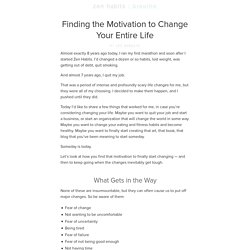

Finding the Motivation to Change Your Entire Life. By Leo Babauta Almost exactly 8 years ago today, I ran my first marathon and soon after I started Zen Habits.

I’d changed a dozen or so habits, lost weight, was getting out of debt, quit smoking. And almost 7 years ago, I quit my job. That was a period of intense and profoundly scary life changes for me, but they were all of my choosing. I decided to make them happen, and I pushed until they did. Today I’d like to share a few things that worked for me, in case you’re considering changing your life. Someday is today. Let’s look at how you find that motivation to finally start changing — and then to keep going when the changes inevitably get tough. What Gets in the Way None of these are insurmountable, but they can often cause us to put off major changes. We all have these fears and reasons for not taking action. They’re all bullshit. Yes, the fear of failure and change and discomfort and uncertainty are real … but they’re not good enough reasons for inaction. The Make It Happen Actions. The Lies Your Mind Tells You to Prevent Life Changes. 10 Damaging Lies and Excuses Your Mind Loves to Tell You.
Email It is ultimately only our own thoughts that hurt us.

The mind is a wonderful thing. It’s also a total liar and an excuse machine that frequently tries to convince us not to take actions we know are good for us. In the end, this prevents many positive changes from taking place in our lives. I’ve had to learn to watch these lies and excuses very carefully in order to make the positive changes I’ve made in my life: a healthier diet, regular exercise, meditation, more sleep, daily writing, better planning, less procrastination, more focus, etc. If I hadn’t learned about these lies and excuses, and how to suppress them, I would never have succeeded in making these positive changes.
So why does the mind lie to us and make irrational excuses? Because the mind wants comfort – that’s why. So let’s expose 10 of the cowardly mind’s most damaging lies and excuses once and for all: Reminder: Have you checked out our book? Your turn… 15 Things Stopping You from Moving Forward. In a culture that seeks quick results, we must learn the beauty of effort, patience, and perseverance.

Be strong, present, and steadfast. Have you ever told yourself that you’re going to make something happen and then nothing happened? That’s because you didn’t follow-through. You didn’t have the right rituals in place – little things you do each day that build up and gradually condition your body and mind to make things happen. Rituals define you. If you’re out of shape and overweight, you have different rituals than someone who’s physically fit.
This may be a bit of a generalization, but it’s not far from the truth for the average able-bodied person. Injunctions. Disagreement.
Adversity. Change Curve. The Top 10 Mistakes in Behaviour Change (and How to Avoid Them) Source: PicJumbo.

Learning new behaviours is undoubtedly hard. You have obstacles to overcome, resistance to contend with and an environment to redesign. But behaviour change is a lot harder when you make mistakes: ones that are common, but often overlooked or disregarded because of their simplicity. The problem is, we have a natural tendency to assume blame when our new habits don’t stick. We assume we are the problem, when the reality is it was the strategy we were using to begin with. It’s simple: if you can change your strategy, you can change your behaviours. The following are the top 10 mistakes in behaviour change as researched by Professor B.J. Mistake #1: Relying on Willpower for Long-Term Change Like most people, I used to rely on willpower to change my behaviours.
But the truth is willpower is a limited mental resource and the more you use it, the more it impairs your self-control. SOLUTION: Pretend willpower isn’t even an option. Figure 1. The result? Sources Acknowledgements. Twice, Then Quit: How to Train for Resistance to Change. One of the most important skills regarding long-term habit formation is learning how to be comfortable with discomfort.

If you can master comfort in discomfort, you can master any obstacle you encounter. Discomfort, often in the guise of resistance, is one of the most common causes of procrastination. Procrastination causes us to offset positive habits in favour of immediate gratification and put off changing negative behaviours. The temptation to succumb to binge eating, cigarettes, negative thinking and television to name a few, is inevitable – but it’s also surmountable, once you learn how to overcome resistance. Resistance is uncomfortable and often avoided at all costs. It’s a given: If there’s an easier choice, chances are we’re going to choose it. This is why bad habits are hard to break: If there’s a more familiar (and easier) option, we’re going to settle on it (and we can’t be blamed for doing so). Environment Design. How to Change Other People.